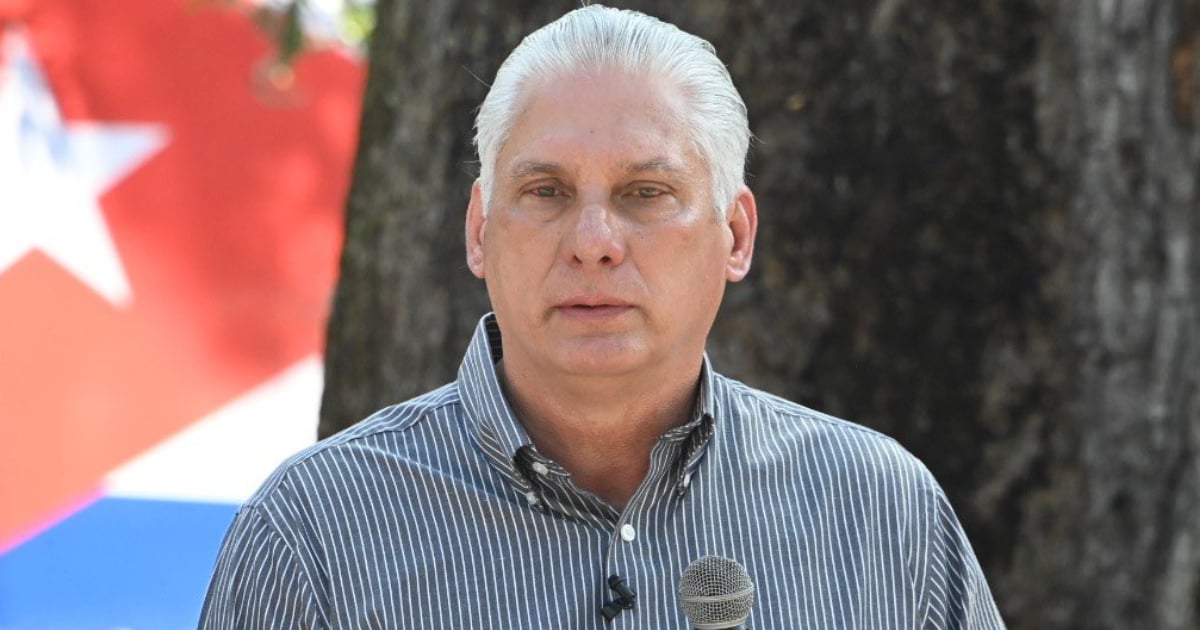
Related videos:
In the midst of one of the worst energy crises in recent months, Miguel Díaz-Canel thanked Cubans on Monday for their "understanding" following the collapse of the National Electric System (SEN), which left several provinces without power for more than 48 hours.
Far from providing concrete solutions, the president warned that the country continues to face a serious energy deficit and made it clear that power outages will persist.
"Thank you, Cuba, for your understanding during the hours of uncertainty and discomfort caused by the disconnection from the SEN. And thanks to the workers and management of the Unión Eléctrica who faced it without a moment's rest. We continue to have a deficit, but we are now connected," he wrote on his X (Twitter) account.
This apparent patience of the Cubans in enduring blackouts with discipline should actually be understood in a different way. The despair, anger, and frustration are held back by the fear of repression and the possibility of facing prison sentences for protesting against the government to demand their rights.
Cubans react to Díaz-Canel's words
Users reacted immediately to the leader's statements. "Thank you, Cuba... what a clown you are, buddy. That's why you have to walk around with 40 bodyguards and bring out the dogs when the electricity goes out because they love and adore you," said an internet user.
"You must be clueless... to talk so much nonsense from your air conditioning while the people are losing what little they have to eat," another person expressed.
Some Cubans have also requested that the government step down. "Resign, party of incompetence! You're a puppet put in place. You in the millionaire elite don't care about the people. It was 48 hours without electricity. Thanks for nothing! After 200 years in power, you still won’t pay for all the harm you’ve done to the people," said a user.
There were those who employed ironic statements to highlight the contradictions observed in Cuba. "We may not have thermoelectric plants, but we have majestic hotels filled with electricity and resources that the people do not have, like the K Tower. But this is Socialism: Poverty for the people and wealth for the leaders," expressed another individual.
More power outages are scheduled in Cuba
The Electric Union confirmed that on Sunday, March 16, the outage lasted for 24 continuous hours, reaching a peak of 1,601 MW at 7:30 PM. The National Electric System was restored, but the situation is not under control.
The crisis has intensified due to the shutdown of multiple generation units. Currently, unit 1 of the CTE Habana, unit 6 of the CTE Renté, and unit 2 of the CTE Felton are out of service.
Additionally, other units are undergoing maintenance, such as the CTE Mariel, Santa Cruz, Cienfuegos, and Renté. This is compounded by limitations in thermal generation of 481 MW and a lack of fuel that has taken 40 distributed generation plants offline, affecting an additional 158 MW.
During the peak hours on Monday night, it is estimated that there will be an availability of 1,995 MW against a demand of 3,280 MW. This will result in a deficit of 1,285 MW and an impact of at least 1,355 MW.
In Havana, the power outages will be rotating and will affect different blocks for several hours. From 10:00 a.m. to 2:00 p.m., service will be cut off in block #1; from 11:00 a.m. to 3:00 p.m., in block #2; from 3:00 p.m. to 7:00 p.m., in block #4; and from 6:00 p.m. to 10:00 p.m., in block #3.
Blackouts affect the lives of Cubans
The energy collapse affects all areas of life in Cuba. Without electricity, drinking water services are interrupted, food refrigeration becomes impossible, and many families cannot cook due to the shortage of gas.
In the last six months, at least four major blackouts have been recorded, leaving the island without electricity for over 50 hours in several regions.
Authorities insist that the situation is due to technical problems and a lack of fuel, without providing a clear solution plan. The population, for its part, faces the uncertainty of an increasingly unstable electrical system, with no real alternatives to mitigate the effects of constant blackouts.
Frequently Asked Questions about the Energy Crisis in Cuba
Why are there still power outages in Cuba?
The blackouts in Cuba persist due to a power generation deficit exceeding 1,500 MW. The situation is exacerbated by breakdowns in several thermoelectric units and the lack of fuel that limits distributed generation plants. This hinders the ability to meet the country's energy demand, resulting in prolonged power outages.
How does the energy crisis affect the daily lives of Cubans?
The energy crisis in Cuba has a significant impact on daily life. Prolonged blackouts disrupt essential services such as the supply of drinking water and the refrigeration of food, making it difficult to prepare meals due to the lack of gas. This situation creates frustration and discontent among the population, who must face these challenges without clear short-term solutions.
What measures has the Cuban government taken to address the energy crisis?
Until now, the measures taken by the Cuban government have been insufficient to resolve the energy crisis. No effective long-term solutions have been implemented, nor has a clear plan been announced to stabilize the electricity supply. The situation remains critical, with a deteriorating electrical infrastructure and a high dependency on fuel, the scarcity of which exacerbates the problem.
What is the government's response to the protests over the blackouts?
The Cuban government's response to the protests over power outages has been limited. Citizens express their frustration in silence, fearful of reprisals, as public demonstrations can lead to confrontations with authorities or even prison sentences. This situation of repression and fear contributes to Cubans enduring the crisis in silence.
Filed under: